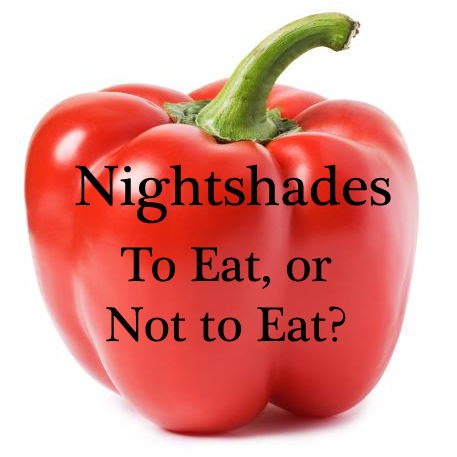Nightshades On Feb 1, 2013, I heard an interesting conversation on the Today show. Star Jones was talking about how she was turning over a new leaf and her doctor had designed a special diet just for her. One of the things she was supposed to avoid was nightshades. It really surprised me to hear that, because most people don’t know what nightshades are. They are a family of fruits, vegetables, and even edible flowers that contain a substance called solanine. This solanine increases any inflammation in the body. On Feb 1, 2013, I heard an interesting conversation on the Today show. Star Jones was talking about how she was turning over a new leaf and her doctor had designed a special diet just for her. One of the things she was supposed to avoid was nightshades. It really surprised me to hear that, because most people don’t know what nightshades are. They are a family of fruits, vegetables, and even edible flowers that contain a substance called solanine. This solanine increases any inflammation in the body.
Think of it as gasoline. If you put gasoline on wood in a fire pit nothing happens until it hits a spark. That spark is the inflammation. Nothing would happen when you came into contact (ate, breathed or touched) something that included solanine if the body were totally without inflammation. Unfortunately we are never truly without inflammation in our bodies. Our normal body functions create some inflammation on an ongoing basis. Since we can’t eliminate the inflammation we need to eliminate the solanine.
Not everyone reacts to the solanine. If you have any chronic pain you are probably sensitive to it. This means if you have been diagnosed with arthritis, fibromyalgia or another ‘pain disease’ this is something you need to look into. The easiest way to determine if you are sensitive to nightshades is to avoid them and see if your inflammation improves. This is also the hardest, because nightshades are in a large percentage of prepared and processed foods. As with any other addiction you need to get it completely out of your system before the symptoms go away. This is difficult to do when manufacturers and restaurants sneak it in without telling you about it. You have to be extremely diligent to truly get them out of your system.
So what fruits and vegetables contain solanine? -
Potatoes
- Peppers
- Tomatoes
- Eggplant
- Tomatillos
- Huckleberries
- Blueberries
- Okra
- Artichokes
- Chili Peppers
- Sweet Peppers
- Pimiento
On labels you want to look for words like:
-
Spices
- Seasonings
- Flavorings
- Seasoned Salt
- Potato Starch
- Modified Food Starch
- Modified Vegetable Protein (MVP)
- Hydrolyzed Vegetable Protein
Condiments such as:
-
Paprika
- Tabasco type sauces
- Ketchup
- Worcestershire
- A-1 Sauces
- Steak, Poultry and Fish Sauces
Other things to avoid:
-
Homeopathic Belladonna
- Envelopes
- Capsicum Creams or Gels
If you find you are craving these foods, and having a hard time giving them up this is a good indication that you are indeed sensitive, if not downright allergic to these substances. When we are allergic to something we usually have withdrawal symptoms when we stop getting them. The body doesn’t like withdrawal symptoms and will make you crave that substance in order to avoid the symptoms.
Nightshades also contain alkaloids that affect the metabolism of calcium and pull it from the bones to be deposited in places where it doesn’t belong, such as the arteries, joints and kidneys.
If you know you are sensitive to nightshades and have inadvertently gotten exposed to them you might want to try increasing your dietary intake of Niacin or Pantothenic acid. These are two of the B Vitamins, so a B Complex supplement might work wonders.
Sources:
The Ultimate Healing System by Donald Lepore, N.D. Copyright 1985
Prescription for Nutritional Healing by Phyllis A. Balch, CNC Copyright 2006
Wholistic Skin and Body Rejuvenation Level Two by Gloria Gilbere, N.D., D.A. Hom., Ph.D., Copyright 2008-2009
|
|